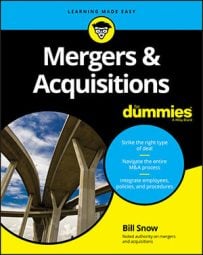Whether you’re a Buyer or Seller, successfully completing M&A transactions requires a skilled team of advisors who have negotiating experience, the right temperament to deal with many different personalities, and the willingness to listen to you whine and pout.
At the core, a deal is very simple: A Buyer gives a Seller money or some other store of value in exchange for a company. But a deal isn’t just about numbers; it’s about the personalities of the Buyer and Seller. Those personalities are what make completing a deal complicated.
Ideally, your deal advisors should have the following traits:
Depth of correct experience: In addition to being an expert in law, accounting, tax issues, or whatever, make sure the person is an expert in M&A deal-making. The attorney who wrote your will or disputed your property taxes may not be the person to advise you during an M&A transaction.
Confidence and self-assuredness: You need someone who’s willing to challenge you and tell you when you have a bad idea. After all, if your advisor can’t or won’t tell you your idea is bad, how can you know when you legitimately have a good idea?
Challenging you is just half the equation; your advisors should be able to stand up to the other side as well.
Tact and professionalism: Negotiations during the sale of business can often become contentious and frustrating, thus devolving into name- calling and recrimination. An M&A professional should always refrain from letting business decisions and discussions become personal.
Ability to serve as a sounding board: A good advisor should be able hold your hand (figuratively, of course) as you navigate the ambiguities of M&A. You also want an advisor who can offer you a shoulder to cry on when things get difficult or frustrating, an ear to listen when you vent, and a firm hand to slap you back into reality when you need it.
Logic and reason: Negotiating doesn’t mean forcing your will upon the other party. It involves understanding the needs and wants of the other side and working together, in good faith, to craft a mutually beneficial agreement. The ability to reason and logically explain your rationale is a key consideration for an advisor, and someone adept at the Socratic method is ideal.
Calmness: Advisors need to be calm, cool, and collected rather than prone to being overly emotional. Emotions can run hot in mergers and acquisitions.
A company often represents a Seller’s life’s work, and dissecting that through the M&A process often makes Sellers feel open and vulnerable as they look back on mistakes they may have made and how those errors are affecting the proceedings.
Buyers worry about financing and whether they’re making a good buy; a bad acquisition can ruin a career. When you’re in that kind of state, you want calm advisors to rely on.
Creativity: A creative brain is a huge asset for an advisor. There’s more than one way to pull off an M&A deal. If one plan doesn’t work, you want an advisor who can jump in with another idea.
Willingness to negotiate: Deals rarely get done if one side is digging in its heels. Advisors who are willing to negotiate and try different ideas are what often get deals across the finish line.
Perseverance and foresight: A good advisor, especially one of the “been there, done that” variety, knows that deal-making is often a marathon, not a sprint. The advisor’s ability to see long term, anticipate problems and the other side’s next move, and stick with the deal is an enormous boon to getting deals done.
Consider asking whether a consultant, especially the legal or accounting type, would be willing to work on some sort of flat-fee basis. You can always offer those consultants the long-term relationship in exchange for a lower rate or flat fee now.

